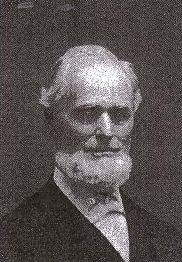 At Dry Creek Baptist Church in Kenton County, Kentucky, on the southern border of the Ohio River below Cincinnati, the Northbend Baptist Association convenes. Congregations in Kenton and Boone counties comprise the association’s membership. Although usually meeting for three days, this year’s meeting is limited to one day, because of the war-caused distractions.
At Dry Creek Baptist Church in Kenton County, Kentucky, on the southern border of the Ohio River below Cincinnati, the Northbend Baptist Association convenes. Congregations in Kenton and Boone counties comprise the association’s membership. Although usually meeting for three days, this year’s meeting is limited to one day, because of the war-caused distractions.
Northbend messengers issue a circular letter, penned by James A. Kirtley (pictured), a leading pastor in the region:
Northbend Baptist Association
Circular Letter, 1861
by James A. Kirtley
Bullittsburg Baptist ChurchThe North Bend Association of Baptists, now in Session with Dry Creek Church, Kenton county, Ky., to the several Churches composing the body:
VERY DEAR BRETHREN: — Never before in the history of our country have external circumstances furnished elements of distraction better calculated to disturb the peace, spirituality and fellowship of the churches, than those which now environ us.
We are in the midst of a political revolution the most astounding, a civil war the most desolating and appalling, and a wide spread excitement which threatens devastation and ruin to all we hold dear in life. As intelligent freemen, heirs to the common heritage of civil and religious liberty, we cannot look upon the ominous events now rapidly transpiring around us without agitation and the most painful solicitude. While anarchy and confusion in many parts of the country have repressed the dictates of reason and justice, giving rise to the wildest disorders, the bitterest denunciations, and the most rancorous feeling of enmity between neighbors, friends and countrymen, (though for the most part, thank God, we, as yet, enjoy comparative tranquility,) may we not, however, as a measure of wise precaution in these evil times, counsel each other to practice that moderation, forbearance and prudent conduct which the gospel inculcates, avoiding with jealous care all tendencies to distrust, alienation and a diminution of reciprocal good will. As citizens of a common country, a common peace and security demand it; while as “fellow-citizens with the saints, and of the household of God,” we are bound by the most inalienable obligations to practice “whatsoever things are true, just, honest, lovely and of good report.”
With amazement we behold the public mind over a large extent of the country, being educated to familiarize itself with, if not to approve, scenes, which in other times would have shocked the sensibilities of an indignant public, and called forth the just condemnation of a Christian people, influenced in too many instances by a vitiated pulpit, and too generally by a prostitute press, threatening to engulf many of the followers of the Prince of Peace in the general demoralization.
How far the rapidly enacting scenes around us are calculated to dissipate the spirituality and mar the harmony and fellowship of Zion, judge ye. Let ours, dear brethren, be the nobler part in these evil times, like the saints of old, who amid the general defection of priest and people “spake often one to another,” and “thought upon the name of the Lord.” Let us, as the conservators of truth, righteousness and peace, more earnestly appeal to a pure gospel, unadulterated with the theories of men, and undiluted with “the waters of strife.” Let us cultivate fervent love for one another, and with a sleepless vigilance give ourselves to prayer that “the God and Father of our Lord Jesus Christ” may keep us “in perfect peace;” that He may overrule the present storm, and cause “all things to work together for good to them that love Him, and who are the called according to his purpose.” AMEN.
The “devastation and ruin” that Northbend Baptists lament at this early date of the war is just beginning. A critical border state, Kentucky remains in the Union throughout the Civil War. Nonetheless, the white population maintains divided sentiments regarding the war, with many men serving on each side of the conflict. Confederate sympathizers form a shadow Confederate government within the state, and many battles are fought, and many lives lost, on Kentucky soil.
Source: Thanks to James Duvall, author of the Baptist History Homepage website, for text of Northbend Baptist Association circular letter and photo of James Kirtley (link).


